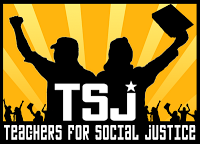[fusion_builder_container hundred_percent=”yes” overflow=”visible”][fusion_builder_row][fusion_builder_column type=”1_1″ background_position=”left top” background_color=”” border_size=”” border_color=”” border_style=”solid” spacing=”yes” background_image=”” background_repeat=”no-repeat” padding=”” margin_top=”0px” margin_bottom=”0px” class=”” id=”” animation_type=”” animation_speed=”0.3″ animation_direction=”left” hide_on_mobile=”no” center_content=”no” min_height=”none”]
Schools have functioned over the centuries to reproduce the status quo and existing power structures – so how can we, as teachers, effectively resist that system while working in it?
This question lay at the center of the 13th annual Teachers 4 Social Justice Conference, held October 12 in San Francisco. Rough estimates put the attendance at over 2,000, including classroom teachers of all levels, college professors, school administrators, nonprofit workers, and community organizers– all united by a common philosophy that education has the potential to liberate an oppressed people (Freire 1968).
While only one day long, the conference followed a full schedule of a morning keynote address by the June Jordan School for Equity and Justice Matters, morning workshops, optional lunch sessions, afternoon keynote by Dr. David Stovall of the University of Illinois at Chicago, and a final session of afternoon workshops. Many different topics were covered by the workshops, which allowed attendants to cater their conference experience to their specific needs. Accordingly, I tailored mine to fit the lesson-planning needs of a first-year teacher, and to touch base with the theories that propelled me into teaching in the first place.
So a representative from the June Jordan School of Equity posed the question: how can we resist the very system that employs us? It’s not just an economic incentive issue—after all, we want to keep our jobs!—but how can we resist the dehumanizing forces underlying our educational system, and how can we establish a more just and equitable right to education for all children?
I followed this question into my afternoon workshop, “A Theory For Change.” There, we reviewed a typology of resistance conceptualized by Solorzano and Delgado Bernal (2001): reactionary behavior includes “acting out” and misbehaving without any direction; self-defeating resistance involves opting out of the system (such as dropping out of school) instead of seeking to change it; conformist resistance includes “band-aid” fixes to problems rather than systemic; and transformative resistance is directed toward transforming the system itself. Most of us admitted to conformist resistance: we tutor students after school and keep our solutions more individually-focused. How, then, we discussed, can we “bump it up” and work toward changing the structures that oppress our students (and us)? (And can we effectively resist while keeping our jobs? Please and thank you.)
The afternoon keynote added more to this idea. Dr. Stovall, wearing jeans and a T-shirt that reads “Hope Dealer,” was not by anyone’s definition a pretentious professor. In fact, I see a lot of commonalities between him and Dr. Jeff Duncan-Andrade of Stanford: both seek social justice in education, both preach their message in their communities and to policymakers, and both still insist on working as high school teachers in their neighborhoods. Coming from Chicago, Stovall argued that we need to reframe the issue of violence as a rational response to the dispossession and continued colonization of black and brown people. Society seems to tell these students over and over again, “go kill yourself; you’re disposable anyway.” School by and large seems to perpetuate this message as well when deficit models are used to understand our children. Stovall posed the question: are we doing school, or are we doing education?
It wasn’t all theory. For my morning workshop I chose “Challenge-Based Learning,” a more community-focused spin on the popular project-based learning. Here, you issue students a challenge that they will seek to solve. While teachers work to create guiding activities, most of the content and direction is student-directed, in turn empowering student voices. Furthermore, the challenges ought to focus on a social issue, such as water cleanliness and access for a science class. We were given time to work on our own CBL project (mine regards the recent economic recession), about which my husband responded, “wait, a conference that was actually practical and useful?”
While I did walk away with specific strategies to use in my lesson planning, the most meaningful thing I took from this conference was inspiration. It was so encouraging to spend an entire day with educators who value social justice; to converse with people who haven’t given up on their students and retain the burning passion for education. It was refreshing to reconnect to why I’m in this field, to revisit the theories that get me all excited, and to take that lens back to my curricula. I even signed up for a subscription to Rethinking Schools, took home a handful of ideas and go-to websites from the resource fair, and am inspired to start a study group with like-minded social justice teachers in Sacramento.
This conference reminded me that choosing to become an educator is in and of itself a political act, so now it’s time I more explicitly wear my activist hat.[/fusion_builder_column][/fusion_builder_row][/fusion_builder_container]



